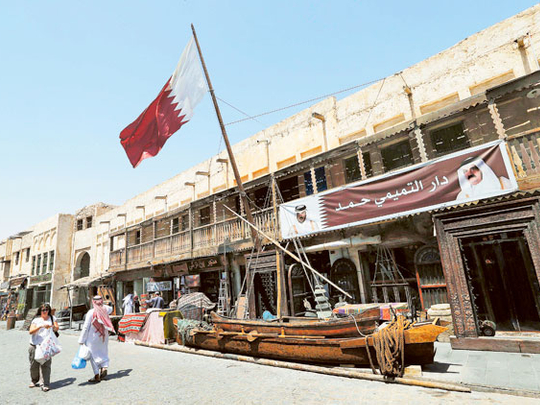
Doha: Qatar prepared for a changing of the guard Wednesday, with the new emir to be sworn in and the powerful prime minister who helped transform the tiny Gulf state into a global player axed.
Shaikh Tamim Bin Hamad Al Thani, 33, was to take the oath after being handed power by his father, Shaikh Hamad Bin Khalifa Al Thani, who voluntarily abdicated as emir on Tuesday.
A new government to be announced later in the day would see state minister for internal affairs Shaikh Abdullah Bin Nasser Al Thani replacing Shaikh Hamad Bin Jassem Al Thani as prime minister, according to several sources as well as Doha-based Al Jazeera.
Shaikh Hamad, a driving force behind gas-rich Qatar’s rise to global prominence, had also held the post of minister for foreign affairs for 21 years.
Shaikh Abdullah, a member of the ruling family, has been state minister for internal affairs since February 2005.
The lineup is also expected to see the appointment of new ministers of the interior, foreign affairs, as well as of finance and commerce, sources said.
Shaikh Hamad’s deputy, Khaled Al Attiyah, could become the next foreign minister, they said.
Energy minister Mohammad Al Sada will retain his post, while Attorney General Ali Bin Fetais Al Marri could become minister of justice, according to informed sources.
The historic transition of power from father to son was widely welcomed by Qatari press as “a first and unprecedented” decision.
The change is not expected to impact the general policies of US-ally Qatar, which has solidly backed the Arab Spring uprisings.
“There will be no substantive change in Qatar’s foreign policy,” says Ibrahim Sharqieh, deputy director of the Brookings Doha Centre. “Shaikh Tamim is the product of his father’s political process which has continued since his accession to power in 1995.”
The departure of flamboyant Shaikh Hamad Bin Jassem, known for his controversial personality as the head of Qatari diplomacy since 1992, “will certainly result in a change in style but not substance,” said Sharqieh.
“Qatar has built bridges with emerging forces in the region, such as Islamist movements including the Muslim Brotherhood, who made their breakthrough in Arab Spring countries,” rising to power in Egypt and Tunisia, he said.
This “will not change during the reign of Shaikh Tamim,” said the analyst.
Shaikh Tamim on Wednesday continued to receive citizens at his palace in Doha, where they had come to swear allegiance to their new leader.
The question of appointing a new crown prince remains to be determined. Based on the constitution, the emir’s son is usually crown prince. But Shaikh Tamim’s eldest son is around five years old.
Leaders of the five other Gulf Cooperation Council states have congratulated Qatar’s young new emir, as has US Secretary of State John Kerry.
Kuwaiti emir Shaikh Sabah Al Ahmad Al Jaber Al Sabah became the first to visit the new Qatari emir on Tuesday. Saudi Arabia’s prince Muqrin Bin Abdul Aziz, Advisor and Special Envoy to King Abdullah Bin Abdul Aziz, Bahrain’s crown prince Salman Bin Hamad Al Khalifa, and Jordan’s King Abdullah also arrived in Doha Wednesday.
A US official accompanying Kerry on his visit Wednesday to Kuwait said the top US diplomat had called Shaikh Tamim and voiced hope for further cooperation with the increasingly active nation.
Kerry said “he looks forward to working with Shaikh Tamim as our two countries promote regional and global stability, prosperity and progress,” the official said.
“He reaffirmed that the United States will continue to stand by Qatar as a valued partner,” he said.
Meanwhile, Iran urged Tamim to revise his country’s policy of backing Syrian rebel groups on Wednesday.
“Hopefully Shaikh Tamim will contemplate the Syrian issue and regarding past policies, he will make a serious revision so we will be able to ... join hands and tackle the Syrian crisis,” Foreign Minister Ali Akbar Salehi told a news conference in Tehran, broadcast by Press TV.
“Given this power transfer that has happened in Qatar, we are hopeful that Qatar will enter a new era in its international interactions both with regional countries and others,” he said.











